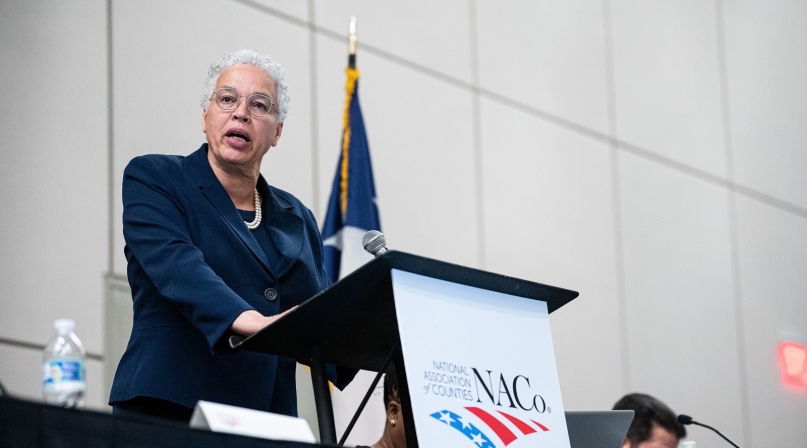Wraparound services needed to remedy homelessness

Key Takeaways
To alleviate the country’s crisis in housing and homelessness, national and local leaders are urging large urban counties to go beyond merely providing more housing and address broader societal issues, like lack of access to health care, food insecurity and substance use disorder.
“We know we could put people in an apartment and take the subsidy, but if we don’t provide really good wraparound support services to address their mental health needs, trauma histories, struggles with drug and alcohol issues, opportunities for education and work — all of those wraparound supports are what keep people housed,” said Jeff Olivet, executive director of the U.S. Interagency Council on Homelessness. “So, the real recipe that we know works is a combination of housing and services, it’s not ‘either or.’
Large Urban County Caucus
July 22, 2023
NACo Annual Conference - Travis County, Texas
“… We need to have an expansive understanding of what homelessness is — it’s driven by structural factors, like the lack of affordable housing, like structural racism, but it also is about the individual,” he said. “If we don’t acknowledge that people have serious needs around behavioral health, health care — around exits from domestic violence, sexual assault and human trafficking — we have to understand both the structural and the individual.”
Kevin James, a senior program manager for the Corporation for Supportive Housing, pointed to the Denver Supportive Housing Social Impact Bond, which offers supportive housing as well as referrals to transportation, food resources and legal and integrated health services, as an example of what can be done at the local level to help avoid the cycle of homelessness.
Over half a million people are experiencing homelessness in the United States, and moving forward, there needs to be more of a priority on preventing homelessness as opposed to beginning to provide support once people are already experiencing it — much of which can and should be done at the local level, Olivet said.
“When I think about prevention, I think about counties,” Olivet said. “Because I start thinking about public health, I start thinking about corrections and re-entry, about the role of health, about intervening in child welfare and foster care so that no young person ever ages out of foster care and into homelessness … If we don’t go upstream with preventing homelessness in the first place, we’re going to be at this work for a long time.”
Implementing Universal Basic Income (UBI) — consistent, unconditional cash payments — is another way that counties across the country, including Cook County, Ill. and Los Angeles County, Calif., are supporting residents. While UBIs by nature provide direct payments under no condition, data from Cook County’s Promise Guaranteed Income pilot shows that the funds are primarily used to pay for housing, food, transportation and medical bills.
“The Promise pilot is rooted in strong evidence that direct cash benefits are spent wisely and support economic mobility,” said Cook County Commissioner Toni Preckwinkle. “These programs are effective in improving entire families’ financial, educational, physical and social outcomes, and it’s a great example of the principles of good governance, because it focuses on high impact, accessible benefits paired with low administrative costs that save taxpayer dollars.”
Attachments
Related News

County Countdown – Nov. 4, 2025
Every other week, NACo's County Countdown reviews top federal policy advocacy items with an eye towards counties and the intergovernmental partnership.

